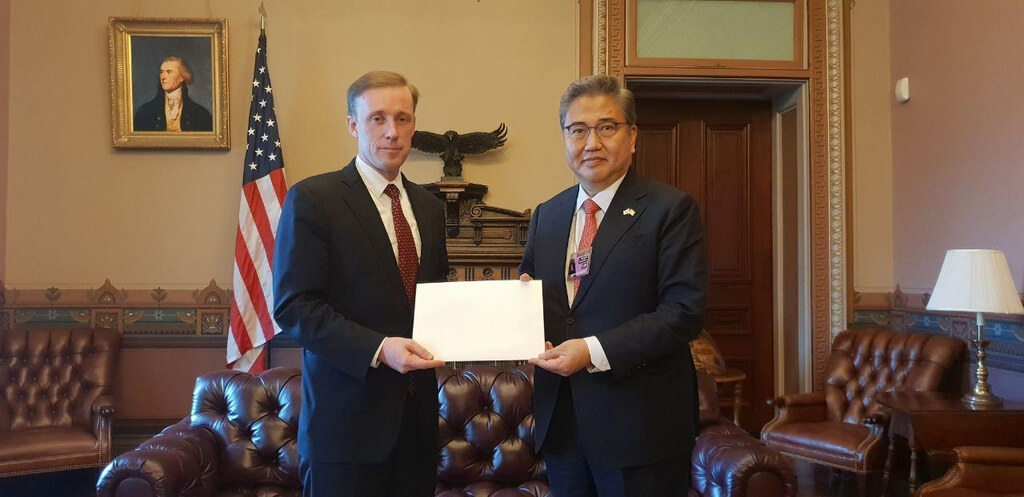During a meeting with United States (US) National Security Advisor (NSA) Jake Sullivan in Washington, a South Korean delegation representing President-elect Yoon Suk-yeol asked for the deployment of US strategic weapons to the Korean peninsula to counter the growing threat from North Korea.
The policy consultation delegation was led by Rep. Park Jin of Yoon’s People Power Party. During his visit, he gave Sullivan a letter incoming President Yoon had written to US President Joe Biden. The letter, Park elaborated, highlights the need to further upgrade the two countries’ alliance in order to counter the growing threat of North Korea’s nuclear program.
“We had consultations on ways to enhance the joint defence posture of South Korea and the US, and strengthen the US extended deterrence,” Park said on the topic of Pyongyang.
He added that he also discussed the possible deployment of US strategic assets to South Korea. “Deploying strategic assets is an important part of strengthening extended deterrence as I said just now. You may understand South Korea and the US discussed the issue today in that sense,” Park said.
I met with Republic of Korea President-elect Yoon's U.S.-ROK Policy Consultation Delegation, led by National Assembly Representative Park Jin. We discussed the importance of the ironclad U.S.-ROK Alliance to tackling the most pressing global challenges. https://t.co/QAvRJmsGUn pic.twitter.com/VNnQwVneiL
— Wendy R. Sherman (@DeputySecState) April 5, 2022
In defence parlance, a strategic asset generally refers to grand military hardware such as nuclear-powered submarines, aircraft carriers, and long-range bombers that are symbolic of military prowess and used to deter provocations or aggression by potential rivals.
Park told reporters after meeting with Sullivan at the White House that the two sides also “exchanged views on the need to hold a US-South Korea summit at an early date” since both “remain determined to strengthen the South Korea-US alliance.”
The discussion on deterrence comes after Seoul’s defence ministry said in a report to the President-elect’s transition team that it was planning to hold discussions with the US regarding the deployment of strategic assets to South Korea amid growing friction with Pyongyang. As of now, the US maintains around 28,500 troops in South Korea as part of the 1953 Mutual Defence Treaty.
It also comes against the backdrop of a stern threat by Kim Yo Jong, the sister of North Korean Supreme Leader Kim Jong-un. On Tuesday, the North’s top diplomat warned that if South Korea chooses military confrontation or launches a preemptive strike, it will be forced to respond with a nuclear attack. “If the situation reaches such phase [attack by Seoul], a dreadful attack will be launched and the South Korean army will have to face a miserable fate little short of total destruction and ruin,” she said.
North Korea has conducted 13 missile launches this year, including seven in January alone, the highest number of tests it has conducted in a single month.
The latest meeting is an indication of the incoming President following through on his promise regarding Pyongyang. Yoon, who is set to take office on May 10, had assured while campaigning that he would firmly deal with North Korea but leave space for the resumption of the stalled inter-Korean dialogue. He also proposed offering economic aid to North Korea conditional upon its progress toward denuclearisation. To this end, he has spoken of the need for a stronger US security commitment to deter North Korean aggression. Furthermore, Yoon has previously expressed his intention to launch preemptive strikes on the North if it displays an intent to attack.
Coinciding with Park’s meeting with Sullivan, the US State Department also reported another meeting between its special representative for North Korea, Sung Kim, and China’s Special Representative for Korean Peninsula Affairs, Liu Xiaoming, in Washington, D.C. on Tuesday. Kim condemned Pyongyang’s recent launches, which he said included powerful intercontinental ballistic missiles (ICBM) and violated multiple United Nations Security Council resolutions. Both sides also discussed opportunities to advance their “shared goal of denuclearising the Korean Peninsula” and ways to encourage the North “to engage in meaningful negotiations.”

